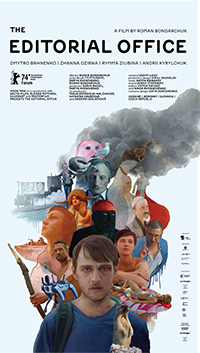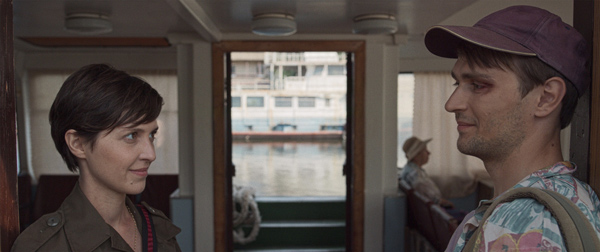The Winds of War: Bondarchuk Straddles a World On a Wire
 While it should play like an absurdist black comedy, Roman Bondarchuk’s sophomore narrative feature The Editorial Office arrives amidst a violent, turbulent atmosphere which somewhat nullifies its prescience. Much like his enjoyably weird 2018 debut, Volcano, he mines subversiveness in surreality, but with his latest, which began production prior to the ongoing Russian war in Ukraine, there’s also an inescapable queasiness in what plays like a prologue to an ongoing madness the eventual distance of which will eventually allow the film a certain novel vibrancy as a time capsule. While mostly set in the recent past, Bondarchuk kicks this parable forward into the future, though what he imagines is hardly an improvement on what came before.
While it should play like an absurdist black comedy, Roman Bondarchuk’s sophomore narrative feature The Editorial Office arrives amidst a violent, turbulent atmosphere which somewhat nullifies its prescience. Much like his enjoyably weird 2018 debut, Volcano, he mines subversiveness in surreality, but with his latest, which began production prior to the ongoing Russian war in Ukraine, there’s also an inescapable queasiness in what plays like a prologue to an ongoing madness the eventual distance of which will eventually allow the film a certain novel vibrancy as a time capsule. While mostly set in the recent past, Bondarchuk kicks this parable forward into the future, though what he imagines is hardly an improvement on what came before.
In 2021’s Southern Ukrainian steppe, what we’re told is six months prior to the escalation of war, young biologist Yura (Dymtro Bahnenko) is most interested in finding marmots, a rodent thought to be extinct in the region. Working for the Natural History Museum and living with his mother (Rimma Zyubina), Yura’s suddenly thrust into a chaos when he captures footage of arsonists alongside his friend, Mykhailo (Oleksandr Shmal). His attempts to have the footage published are continually thwarted, and his friend mysteriously disappears. At last, Yura finds a news portal (ironically named ‘The Truth of the Steppe’) agreeing to publish his news story, where he’s also hired as a journalist. Unfortunately, Yura quickly learns his editor-in-chief (Aleksandr Gannochenko) is hardly interested in factual reporting, and he’s privy to the constant spin doctoring regarding an incumbent mayor for the “No Limits Party,” currently hospitalized during an approaching local election.

In keeping with Bondarchuk’s favored artistic approach, The Editorial Office is definitely a strange bird (though perhaps no stranger than the titular Jonathan Livingston Seagull, as Richard Bach’s 1970s counterculture fixation is a reoccurring subtext). Yura’s exploration and fascination with the tangible, working at the Natural History Museum and searching for the potentially extinct marmots, slides disturbingly away into a continually shifting sense of conspiracy. In his efforts to expose the arsonists setting forest fires, his surprising addition to a seemingly reliable news publication leads him into a strange, political rabbit hole where he learns nothing is ever what it appears to be.
While The Editorial Office is certainly more accessible than Sergei Loznita’s more terrifyingly helter-skelter Donbass (2018), Bondarchuk hits on the same endless propaganda machine in an era less interested in truth than an ongoing obsession with fluctuating optics. Bondarchuk once again explores the Ukrainian steppe, and Yura is not far removed from the protagonist in Volcano, an interpreter subsumed by the mysterious community in a small village. The canvas is much broader this time around, which often feels like a Kafkaesque approach to All the President’s Men (1976). In the background, an American Svengali-swindler preaching about cryptocurrency (who reads a bit like the Andrew Garfield character in Gia Coppola’s blundering Mainstream, 2020) has seemingly hypnotized the masses (amongst them, Yura’s own mother), though this side plot ends up being as tangential as a bunch of absurdist shards.
Bondarchuk’s clearest, most crystallized statement is bluntly administered when Yura is informed “No one gives a shit about facts.” Ending on a hopeful note, albeit showcasing how little might have been learned beyond the inherent progression of political correctness as lip service, The Editor’s Office at one point could have been classified as science fiction. As of now, it’s a film which feels like a nightmare we don’t have the privileged distance of waking from yet.
Reviewed on February 16th at the 2024 Berlin International Film Festival – Forum section. 126 mins.
★★★/☆☆☆☆☆


